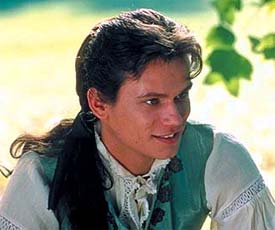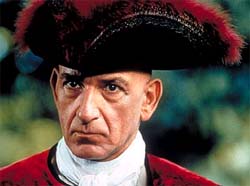
|
It is The Princess' primal moment. She recognizes Otherness, and with it the attendant desire for connection. And it's also a symbol of the historical wrong that she must make right (her father usurped the throne from Agis' father). The Princess feels "a sense of justice as well as some strange inspiration."
For the entirety of Triumph of Love, Peploe sustains the erotic rapture of the vision that is Rodan's booty. The jump-cuts and the frenetic 16mm camera create a world of selected, then isolated, beauty. Sex is palpable everywhere. But it does not infect the world. Rather, the sensual shimmer of Fabio Cianchetti's cinematography cleanses the universe. This intoxicating immediacy is the perfect way to adapt - or, really, to mount - Marivaux's 1732 comedy with film. ("Now!" is the film's first utterance.) The oscillation of theatrical artifice and film reality in every shot is as exhilarating as the way Peploe's careening camera disrupts the perfect Age-of-Reason symmetry of the garden and of the villa. (Or the way David Gilmour's guitar-emotions jazz the precision of the classical music score.) The positive-negative sparks crackle when The Princess first dresses as the boy Phocion, then impersonates a female enemy of The Princess (yes, herself) called Aspasie. The Princess brings sexual desire into the rational world of Hermocrates (Ben Kinglsey), a philosopher who raises Agis to hate the Princess and all women (again connecting social-political systems with sexual repression). The Princess brings out the desires of Hermocrates and his sister Leontine (Fiona Shaw) in a series of love proclamations that are as beguiling as pop songs. Sorvino generates an electric screen presence. So caught up in the sexual surges she unleashes - the sexiness of being desired as a boy or girl - she barely dissipates the pain caused by her deception, conducted through private sorrow and shame. ("I'm losing track of my own plot, I'm afraid," The Princess' classic summation of anybody's romantic travails.)
This gender-bending links the play right up to the pop present: genders, sexualities as easily available as flipping the radio dial. Peploe hits the bull's-eye. She relates this modern phenomenon to Marivaux's own transformation of comedia d'el arte tropes into a singular style called "marivaudge." It's a highly stylized representation of human folly and growth, of the essences of experience. Those are the truths pop usually exploits and simplifies. Peploe, with her own sense of justice and strange inspiration, footnotes husband-collaborator Bertolucci's definitive Last Tango in Paris. It's an eternal endeavor. As Pauline Kael concluded her famous review of "Last Tango": "The biology that is the basis of the 'tango' remains." From the marivaudge to the Bertolucci-esque, Triumph of Love dramatizes the richness of sexual and romantic attraction. At the revelation of The Princess'/Phocion's true sex, Leontine - who hallucinates an audience to this farce, who invents an electrical generator - collapses to the ground and cries out: "I am going out of my mind!" Sex and love in a PoMo world is like that! Peploe appreciates the potential of pop rituals, as assuredly as Marivaux did that of comedia d'el arte. Thus the Bringing Up Baby screwball shenanigans, the group musical number at the end, and the actors giving their bow in modern clothes. Peploe clarifies, not simplifies, the culture's confusion of signs through ritual. That is the triumph of cinema, of theatre, of love. Triumph of Love is almost as exquisite and profound as Betty Everett's classic pop song "It's in His Kiss." (Think about it!) Even after the ritual is over, the physics that is the basis of the comedia d'el arte remains. |
|
 'Hot ass' actor Jay Rodan stars as Agis in Clare Peploe and Bernardo
Bertolucci's Triumph of Love
'Hot ass' actor Jay Rodan stars as Agis in Clare Peploe and Bernardo
Bertolucci's Triumph of Love Mira Sorvino, as the Princess, gets a view of Agis' bum
Mira Sorvino, as the Princess, gets a view of Agis' bum  But Ben Kinglsey, Hermocrates, pushes Agis to hate all women, including the Princess
But Ben Kinglsey, Hermocrates, pushes Agis to hate all women, including the Princess